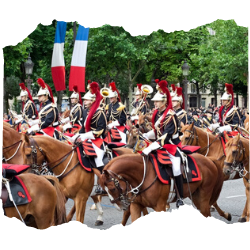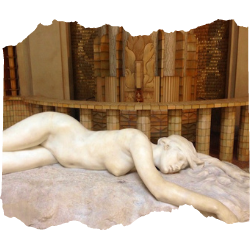Unsure about your French table manners? Click Here to download > > How to avoid these 10 food etiquette mistakes !
- Home ›
- Culture & Civilization ›
- Renaissance to Republic ›
- Why the French Love/Hate Napoleon
Napoleon Bonaparte: The Man The French Love To Hate
Updated 10 November 2024 by Leyla Alyanak — Parisian by birth, Lyonnaise by adoption, historian by passion
Some 200 years ago, on 5 May 1821, Emperor Napoleon Bonaparte died in exile on the island of St Helena, an ignominious end for someone who had ruled most of Europe and whose conquests would make him a household name.
No one can deny his accomplishments but still, two centuries after his death, no one can agree on whether he was a brilliant ruler or an evil dictator. He remains as controversial as ever.
In a sense, Napoleon feeds into our French contradictions, where we tend to secretly admire strong men while reviling authoritarianism in public.
So why do the French love to hate Napoleon so?
However one feels about him, he remains one of France's most famous citizens, up there with Charles de Gaulle and Louis XIV and Joan of Arc.
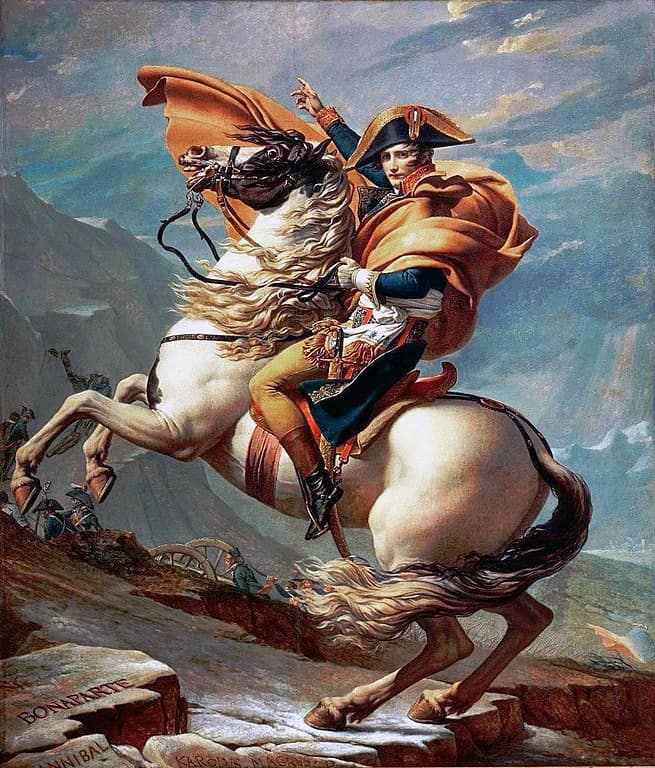 Napoleon crossing the Alps on his way to beat the Austrians at Marengo (Source)
Napoleon crossing the Alps on his way to beat the Austrians at Marengo (Source)Napoleon's rise to power (and his fall): a brief timeline
Napoleon enjoyed an impossibly rich and varied career, transforming the face of France and Europe in the process.
Here's a brief 'what and when' to help us keep track of this very busy man. It is, of course, incomplete and does not begin to do his life and career justice.
- Napoleon's birthplace is Corsica. He was born in 1769 to minor nobility, attends military school (three of them) in France and ends up as an artillery officer with a genius for mathematics.
- He first gains notoriety by breaking the English siege of Toulon, which fuels his meteoric rise.
- In 1796 he wins a war against Austria, and marries Josephine, a widow with two children.
- He then goes to Egypt (not strong enough to invade England, he hopes to at least weaken the English trade routes through Egypt). He wins battles against the Egyptians and the Turks but cannot win the war: the English under Admiral Nelson have destroyed the French fleet. Cut off from France, he is forced to return home, leaving his troops behind. In a masterful show of propaganda, he spins this defeat into a victory. After all, in those days there was no social media to question his account.
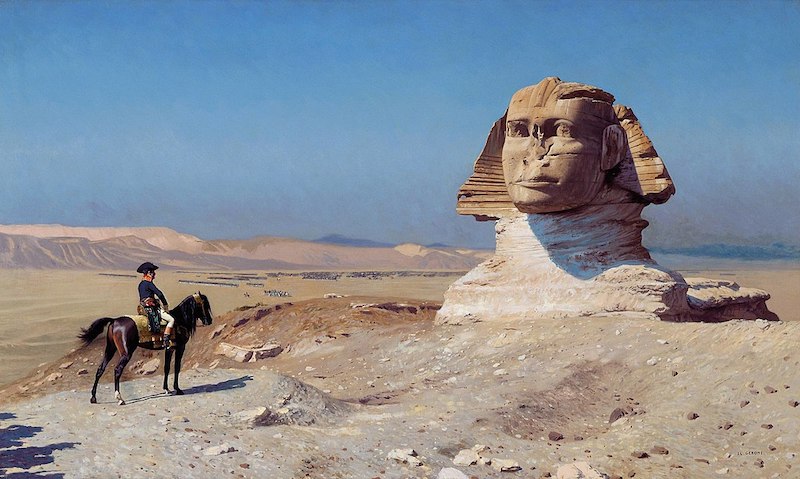 Napoleon stands before the Sphinx in Egypt, long blamed for the structure's missing nose. Not so. New historical evidence points to an earlier destruction in the 15th century
Napoleon stands before the Sphinx in Egypt, long blamed for the structure's missing nose. Not so. New historical evidence points to an earlier destruction in the 15th century- In 1799, in what becomes known as the coup of 18 Brumaire, he feels strong enough to seize power, becoming Consul, then First Consul.
- In 1800 at Marengo, his victory over Austria leaves him in charge of a vast swathe of Europe.
- From 1803, Napoleon embarks on the Napoleonic Wars, during which he sells Louisiana to the Americans for US$15 million, doubling their territory. He needs the money to fund his wars.
- And in 1804, he embarks on major social reforms, from the Civil Code to educational reform. To give you a measure of the personage, he crowns himself Emperor.
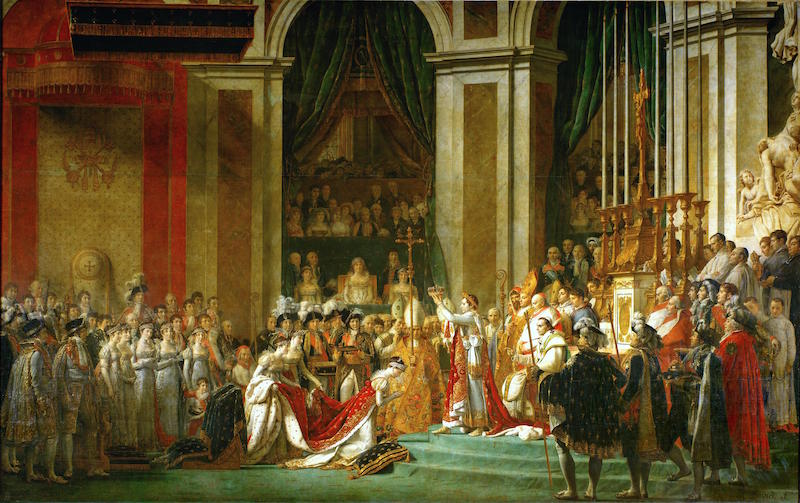 Napoleon crowns himself in 1804. According to legend, rather than let the Pope crown him, he grabbed the crown and put it on his own head
Napoleon crowns himself in 1804. According to legend, rather than let the Pope crown him, he grabbed the crown and put it on his own head- In 1805 he is beaten at sea by the British fleet at the battle of Trafalgar. France's navy is destroyed, so Napoleon focuses on land battles, most of which he wins. Austerlitz is one of the most famous.
- In 1809 he divorces Josephine to marry a younger, child-bearing Marie-Louise, daughter of Austria's emperor (yes, politics are involved).
- Having launched a blockade of England, he is frustrated by Russia, who breaks ranks, prompting Napoleon – overstretched and overconfident – to march on Moscow in 1812. Winter and the Russian decision to retreat out of his reach are his enemies and he loses (half a million soldiers die during the Russian campaign).
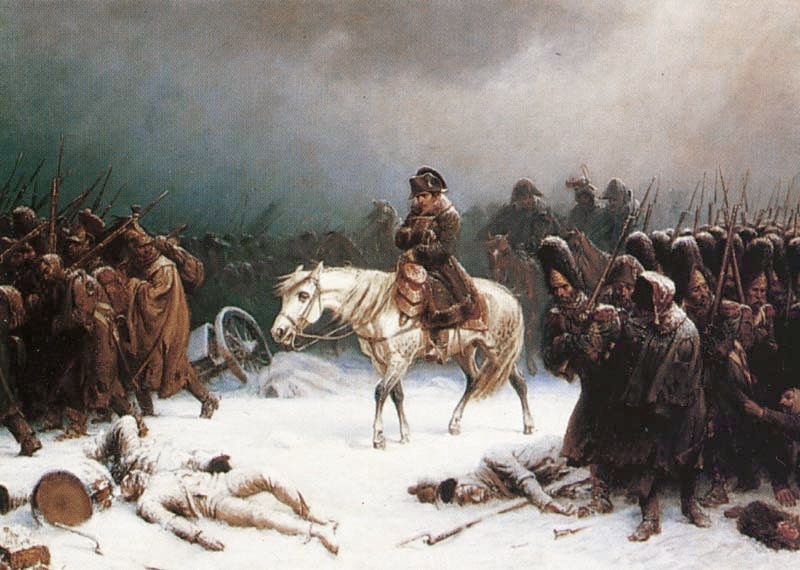 Napoleon's retreat from Russia (Source)
Napoleon's retreat from Russia (Source)- What follows is a string of defeats for Napoleon, leading ultimately to a coalition of his enemies, who invade and capture Paris.
- In 1814 he abdicates and is exiled to Elba. He sneaks off the island a few months later with a band of loyal soldiers and sails to Golfe Juan on the Mediterranean coast, marching towards Paris and gathering support along what we now celebrate as the Route Napoleon (the site is in French but the maps are not). This is known as the Hundred Days, which is approximately how long he stays in power the second time...
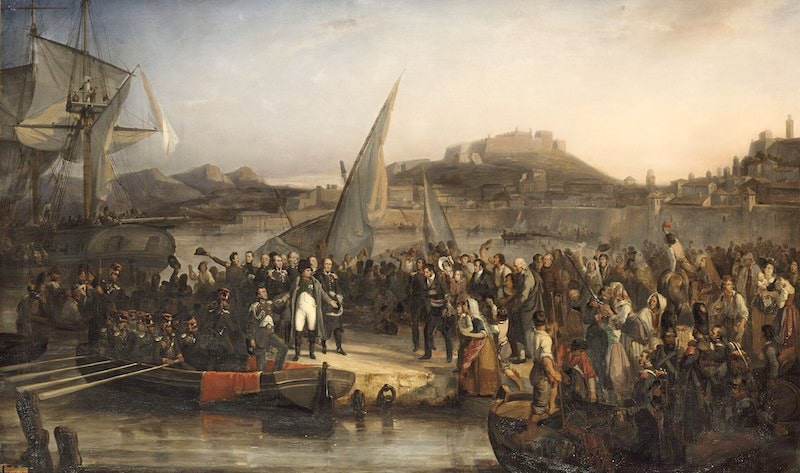 Napoleon leaves his exile on Elba for what will become his Hundred Days of second rule (Source)
Napoleon leaves his exile on Elba for what will become his Hundred Days of second rule (Source)- In 1815, he suffers an ignominious defeat at Waterloo at the hands of the Duke of Wellington and is exiled by the British to St Helena, an escape-proof rocky outcrop in the middle of nowhere, in the South Atlantic.
- He dies there in 1821, but his body is brought back to Paris some years later and buried by – the irony shouldn't be lost on us – the latest member of the restored monarchy, that institution he had fought so hard to abolish. (The monarchy won't last long, by the way.)
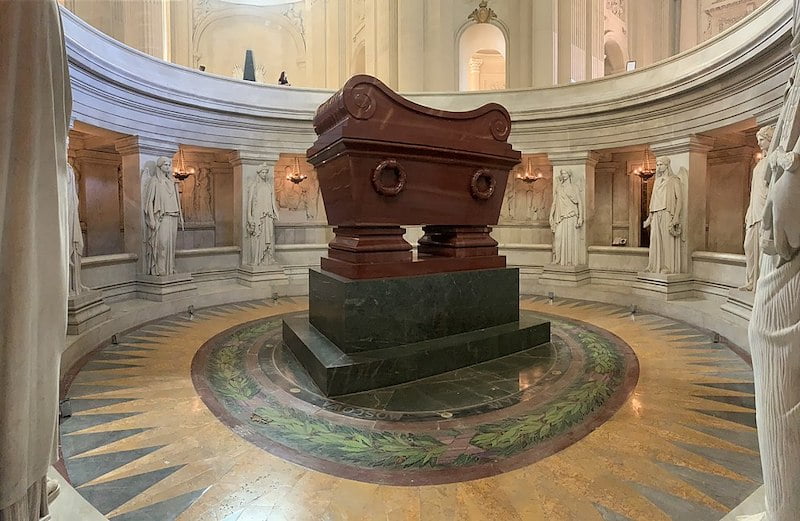 Napoleon's sarcophagus at Les Invalides in Paris (Source)
Napoleon's sarcophagus at Les Invalides in Paris (Source)Why is Napoleon still so controversial?
This is one of those historical figures about whom everyone has an opinion in France. Mentioning his name is a good way to start a debate.
No matter that two centuries have passed – as historians continue to uncover new tidbits, the controversies are relaunched as though this was breaking news and he had died yesterday.
My own mother, throughout her life, revered him, preferring to gloss over his failings and focus on his achievements, as many French do. I've inherited her fascination, but not her admiration...
- Whatever her opinion, he was a terrible misogynist who believed women should obey their husbands (even though his own wife, Josephine, was consistently unfaithful) and have a lot of children (he didn't do well here, either). Driving the point home is this quote from Napoleon: “Women are nothing but machines for producing children.”
- Was he a brilliant leader of men or a selfish, ambitious self-aggrandizer? A bit of both. He is accused of having abandoned his soldiers in Egypt to rush back to Paris at a politically opportune moment. His supporters say he had no choice: cut off from retreat and supplies, he had no way to bring his troops home. So he left them. The debate continues.
- He had an equivocal relationship with religion. The French Revolution had abolished Catholicism and the clergy, yet Napoleon reinstated it as the primary religion of the state. At the same time, he was remarkably tolerant: he emancipated Jews (economics had something to do with it), and during the Egyptian campaign he flirted with Islam. He is known to have said: "If I had to choose a religion, the sun as the universal giver of life would be my god."
- He abolished and then reinstated slavery. He did abolish it in the end, but still...
- He fought for the Revolution and against royal rule, and helped reduce class inequalities – yet he crowned himself Emperor and tried to make the title hereditary. He may have wanted to do away with the monarchy, but he went too far and in a sense became what he abhorred.
- His relationship to the French Revolution was ambivalent. He maintained many of the Revolution's gains – equality (for men) before the law, advancement on merit rather than birth, religious tolerance – but overturned some of its worst excesses, like the Reign of Terror (daily guillotinings, anyone?) or the abolition of Christianity.
- He was a genius in battle, winning many wars, but in the end he left France smaller than he had found it. He was a brilliant military strategist, but in his ambition he over-extended himself.
- The sale of Louisiana to the Americans for a pittance remains controversial but many people would rather not discuss it at all, given the enormity of the transformations that might have ensued had the Louisiana Purchase not taken place.
- His achievements are undeniable: he set the foundations of what France is today. He developed the Napoleonic Code, replacing antiquated feudal laws with a system of French civil law we follow to this day (as do a number of other countries); he set up our bureaucracy (I'm not inclined to thank him for this), centralizing and modernizing our administrative system; and he overhauled France's educational and military structures.
Whether autocratic or a revolutionary genius, few French are indifferent to Napoleon. He is the man the French love to hate and hate to love.
A British view of Napoleon: satires and caricatures
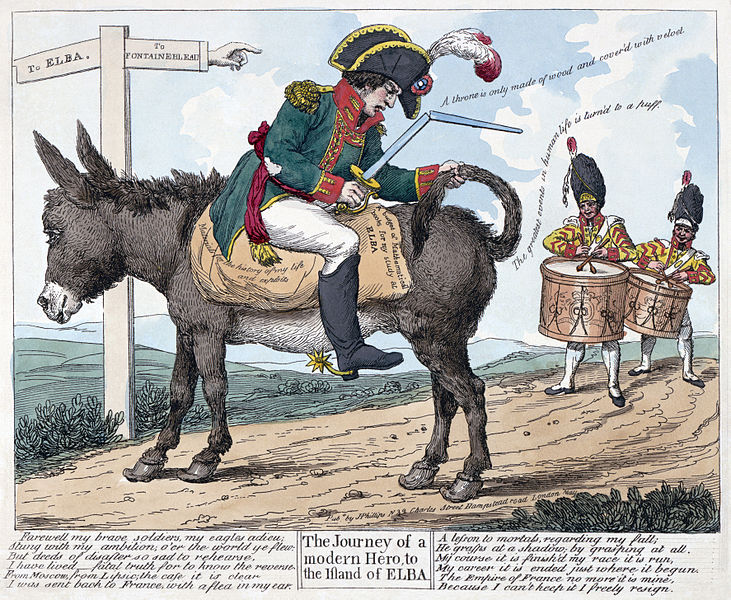 Exile to Elba
Exile to Elba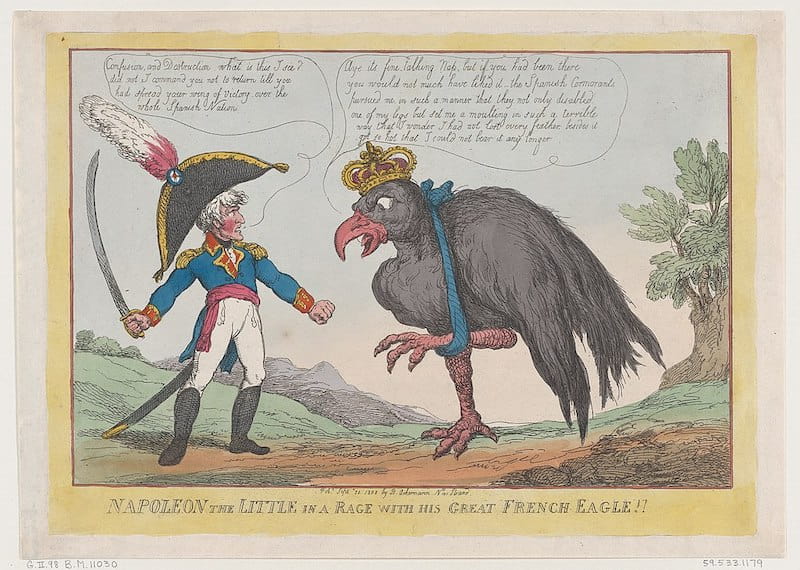 Napoleon in a rage
Napoleon in a rage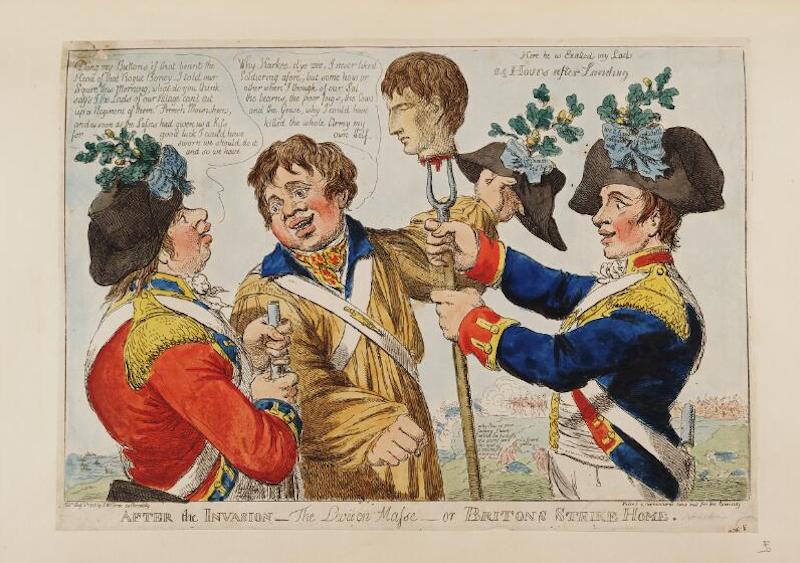
Facts about Napoleon Bonaparte you may not know
In case you are thirsty for even more Napoleonia, here they are, random facts we may have forgotten since we sat on those school benches.
- Napoleon may be famous as an emperor, but let's not forget he was also a Corsican nationalist and a defender of the French Revolution before becoming Emperor of France.
- He was born with the name Napoleone Buonaparte, which he Frenchified. But he never lost his Corsican accent.
- His wife, Josephine, was 32 and widowed when they met; he was 26. Since that wasn't socially acceptable, they both lied about their age on their wedding certificates to narrow the gap.
- Josephine was almost guillotined during the French Revolution and escaped by a hair when executions stopped just before it was her turn.
- She had two teenage children when they married and never bore him an heir. So he repudiated her (and divorced her, since divorce was now legal) and wed a younger woman, Marie-Louise (daughter of the Emperor of Austria, his traditional enemy), who bore him a son, Napoleon II. This son died young, in his twenties, and would never step into his father's shoes. The emperor did, however, sire several illegitimate children.
- Napoleon's dynasty would come to an end when is nephew, Napoleon III, abdicated in 1870 after France lost the Franco-Prussian War and brought the Second Empire to a close.
- Napoleon's army discovered the Rosetta Stone during the Egyptian campaign, whose inscriptions in three languages allowed a certain Champollion from Grenoble to decipher its hieroglyphics. It now sits in the British Museum, captured in Egypt by the English (Egypt wants it back, by the way).
- The year after he crowned himself Emperor of France, he became King of Italy.
- During his second exile, he was so well guarded by the English that despite a number of plots to break him out, he was never to escape. A squadron of ships stood guard on continuous patrol, and some 300 men with 50 cannons made sure he stayed put.
- Napoleon may have kept a vial of poison around his neck, just in case. In fact, he did attempt suicide at least once, but failed.
- The death of Napoleon remains slightly mysterious, although science is beginning to feel confident in saying he did not die of arsenic poisoning, as was long believed, but of stomach cancer (like his father).
Quotes by Napoleon Bonaparte
Napoleon is known for many things and among them are sayings that have helped fuel our opinions of him. You may have heard a few of these, perhaps not knowing where they came from. Napoleon's quotes are quite revealing about his personality and beliefs.
- “The only way to lead people is to show them a future: a leader is a dealer in hope.”
- “Never interrupt your enemy when he is making a mistake.”
- “Envy is a declaration of inferiority.”
- “If you wish to be a success in the world, promise everything, deliver nothing.”
- “Impossible is a word to be found only in the dictionary of fools.”
- “History is the version of past events that people have decided to agree upon.”
- “In politics, stupidity is not a handicap.”
- “Religion is what keeps the poor from murdering the rich.”
- “History is a set of lies agreed upon.”
- “If you want a thing done well, do it yourself.”
- “Glory is fleeting, but obscurity is forever.”
- “Men are moved by two levers only: fear and self-interest.”
- “Ability is nothing without opportunity.”
A final word...
Despite all the ink used up in writing about Napoleon, there's always one question that seems to rise above all the others: How tall was he?
His reputation as a short man comes from a faulty conversion from French measures to English measures... he was actually 5'6", or 167cm, quite average for the time, neither short nor tall.






